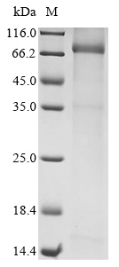The generation of recombinant human Mannan-binding lectin serine protease 2 (MASP2) in E. coli involves co-cloning the target gene into an expression vector with N-terminal 10xHis-tag and C-terminal Myc-tag gene, which is transformed into E. coli cells. The target gene corresponds to the 16-686aa of human MASP2 protein. These cells are cultured for the protein expression. The cells are lysed to release the expressed protein, which is purified using affinity chromatography. Protein purity is assessed with SDS-PAGE, exceeding 85%.
Human MASP2 is a crucial component in the lectin pathway of the complement system. MASP2 plays a significant role in activating the lectin pathway by cleaving C4, which initiates the complement cascade [1]. This activation process involves the formation of complexes such as C4bC2, which are then cleaved by activated C1s or MASP2 [2]. Research revealed that MASP2 is present in human kidneys and is involved in the proteolytic activation of the epithelial sodium channel [3].
MASP2 deficiency has been associated with various conditions, including tuberculosis susceptibility [4] and pulmonary tuberculosis [5]. Studies have shown that MASP2 interacts with other proteins like MBL and forms complexes that activate the complement system [6]. MASP2 gene polymorphisms have been linked to hepatocellular carcinoma [7] and human T-lymphotropic virus type 1 infection [8].
References:
[1] M. Navarrete, J. Ho, O. Krokhin, P. Ezzati, C. Rigatto, M. Reslerovaet al., Proteomic characterization of serine hydrolase activity and composition in normal urine, Clinical Proteomics, vol. 10, no. 1, 2013. https://doi.org/10.1186/1559-0275-10-17
[2] V. Krishnan, Y. Xu, K. Macon, J. Volanakis, & S. Narayana, The structure of c2b, a fragment of complement component c2 produced during c3 convertase formation, Acta Crystallographica Section D Biological Crystallography, vol. 65, no. 3, p. 266-274, 2009. https://doi.org/10.1107/s0907444909000389
[3] R. Zachar, S. Thiel, S. Hansen, M. Henriksen, M. Skjoedt, K. Skjødtet al., Mannan-binding lectin serine protease-2 (masp-2) in human kidney and its relevance for proteolytic activation of the epithelial sodium channel, Scientific Reports, vol. 12, no. 1, 2022. https://doi.org/10.1038/s41598-022-20213-8
[4] Z. Li, M. Wang, H. Zhong, X. Huang, X. Wu, X. Zhanget al., Impact of masp2 gene polymorphism and gene-tea drinking interaction on susceptibility to tuberculosis, Scientific Reports, vol. 11, no. 1, 2021. https://doi.org/10.1038/s41598-021-86129-x
[5] A. Sokołowska, A. Szala, A. Świerzko, M. Kozińska, T. Niemiec, M. Błachnioet al., Mannan-binding lectin-associated serine protease-2 (masp-2) deficiency in two patients with pulmonary tuberculosis and one healthy control, Cellular and Molecular Immunology, vol. 12, no. 1, p. 119-121, 2014. https://doi.org/10.1038/cmi.2014.19
[6] M. Henriksen, J. Brandt, J. Andrieu, C. Nielsen, P. Jensen, U. Holmskovet al., Heteromeric complexes of native collectin kidney 1 and collectin liver 1 are found in the circulation with masps and activate the complement system, The Journal of Immunology, vol. 191, no. 12, p. 6117-6127, 2013. https://doi.org/10.4049/jimmunol.1302121
[7] L. Segat, A. Fabris, L. Padovan, M. Milanese, D. Pirulli, F. Lupoet al., Mbl2 and masp2 gene polymorphisms in patients with hepatocellular carcinoma, Journal of Viral Hepatitis, vol. 15, no. 5, p. 387-391, 2008. https://doi.org/10.1111/j.1365-2893.2008.00965.x
[8] A. Aghamohammadi, H. Rafatpanah, M. Maghsoodlu, N. Tohidi, F. Mollahosseini, & M. Shahabi, Mannose binding lectin‐associated serine protease 2 (masp2) gene polymorphism and susceptibility to human t‐lymphotropic virus type 1 (htlv‐1) infection in blood donors from mashhad, iran, Microbiology and Immunology, vol. 66, no. 10, p. 460-464, 2022. https://doi.org/10.1111/1348-0421.13022






